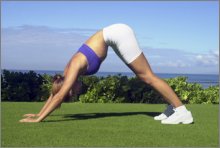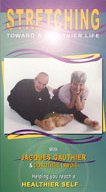|
|

|

Back Pain: The Seven Most Common Sources of It and Natural Steps to Remedy It
by www.SixWise.com Back pain is extremely common, with four out of five adults
facing it at least once during their lives, according to the
Mayo Clinic.
|

Most back pain is caused by overusing, straining or
injuring the muscles and ligaments in your back -- while
doing routine, everyday things!
|
And a nationwide phone survey of over 1,200 Americans, sponsored
by Stanford University Medical Center, ABC News and USA Today,
found that back pain was the most common type of pain reported
(followed by knee and shoulder pain, joint pain and headaches).
Because your back is part of your body's core
muscles, and is necessary for nearly every movement you
make, it's also very vulnerable to injury. In fact, most back
pain is caused by overusing, straining or injuring the muscles,
ligaments and disks that support your spine.
Back pain, therefore, commonly results from:
-
Poor
posture
-
Sitting
at a desk all day
-
Lifting something heavy improperly
-
A sudden, awkward movement (such as from sneezing)
-
Sleeping on an uncomfortable, or unsupportive, mattress,
or in an awkward position
-
Carrying around a heavy handbag or backpack
-
Being overweight
Relieving Back Pain Naturally
Surveys have found that more than half of Americans are suffering
from physical pain that leads to stress and irritability,
and has a negative impact on their personal relationships,
work productivity and daily routine.
Fortunately, there are many natural tools within your reach
that can help you relieve back pain and support a healthy
spine.
-
Use proper posture. This includes while standing
or sitting. How do you know if your posture is proper?
Stand with your back to a wall. If your shoulders, bottom
and back of head are all touching the wall, then your
posture is correct.
|

Exercise not only strengthens your back, making it
less prone to injury, it also prompts your body to release
endorphins, which block pain signals from reaching your
brain.
|
-
Get a new, medium-firm mattress. An old, lumpy
or overly soft mattress could be causing you unnecessary
pain. Studies show that a medium-firm mattress is best
if you have back pain.
-
Lose weight. If you're overweight, you're straining
your back muscles with every move you make.
-
Exercise regularly. Low-impact exercises such
as aerobics, yoga,
swimming and walking will increase the strength in your
back and help your muscles to function better.
Further, according to the Mayo Clinic, exercise also
helps relieve pain by prompting your body to release chemicals
called endorphins that actually block pain signals from
reaching your brain.
|
Stretch Your Back Pain Away with
"Stretching Toward a Healthier Life"
 If
you have back pain you are doing yourself an extreme
disservice by not stretching. If
you have back pain you are doing yourself an extreme
disservice by not stretching.
As with exercise, proper form in stretching has everything
to do with achieving the maximum health benefits (and
avoiding personal injury.) Most effective is to see--step-by-step--the
proper form of each and every stretch in action by an
expert versus seeing a single snapshot of the stretch
in a book (or just reading about each stretch.)
Stretching Toward a Healthier Life on DVD gets our
top recommendation for five key reasons:
-
It presents 15 stretches that stretch all the key
muscles groups throughout your entire body (something
we did not see with several other guides we reviewed).
-
It only takes about 15-20 minutes per day total
to do the complete stretching.
-
Stretching expert and host Jacques Gauthier and
his wife Dorothee Lavoie demonstrate each stretch
in their entirety, including insights on what NOT
to do.
-
In addition to stretching nearly 100% of the muscles
in your body, Gauthier chose 15 stretches that you'll
find actually feel good and are easy to do (many
stretches in other programs are not).
-
The production quality of the video and sound is
excellent. (Many other DVD productions on stretching
are not.)
Find
out more about Stretching Toward a Healthier Life with
FREE SHIPPING for a Limited Time!
|
"Endorphins are the body's natural pain-relieving chemicals
that in many cases are more powerful than morphine,"
says Edward Laskowski, M.D., a physical medicine and rehabilitation
specialist and co-director of the Sports Medicine Center at
Mayo Clinic, Rochester, Minn.
-
Be careful when lifting. If you're lifting something
heavy, let your legs, not your back, do most of the work.
-
Stretch regularly. Stretching helps to reduce
tension in your muscles, improve flexibility and range
of motion, and may slow the degeneration of your joints.
The act of stretching alone will also improve your blood
circulation and help you to relax -- a key to pain relief.
To learn how to do the right type of stretching -- the
kind that actually feel good while you do them (and after!)
-- we highly recommend the Stretching
Toward a Healthier Life DVD.
-
Get a massage.
The American Massage Therapy Association (AMTA) says massage
therapy helps patients become more aware of their bodies
and the sources of pain. It also better familiarizes patients
with the pain they experience, and improves confidence
by encouraging patients to effectively cope with their
pain.
-
Try BlueStopMax
Pain Gel. This is a natural, proven topical gel
that will relieve your pain in minutes, and is an excellent
addition to the natural tools discussed.
-
Reduce inflammation in your body. When your body
is in a chronic state of inflammation, the inflammation
can lodge in your muscles, joints and tissues. Over time,
this can lead to physical pain, as well as a number of
diseases including heart disease. Emotions (too much stress),
diet and lifestyle all contribute to inflammation.
One of the safest, low-risk things you can do to lower your
risk of inflammation is to modify your lifestyle and dietary
choices. This means eating a variety of anti-inflammatory
foods (fruits and vegetables), limiting or avoiding all together
the pro-inflammatory foods (highly processed foods, high-sugar
foods, trans fats, etc.), exercising and quitting smoking
(if you do).
Recommended Reading
Pain
in the Wrist? FREE Trigger Point Self-Test and Self-Treatment
Solutions
6
Reasons (Besides Great Looks) to Strengthen Your Abdominals,
and 5 Exercises to do it Properly
Sources
MayoClinic.com
WebMD.com
To get more information about this and other highly important topics, sign up for your free subscription to our weekly SixWise.com "Be Safe, Live Long & Prosper" e-newsletter.
With every issue of the free SixWise.com newsletter, you’ll get access to the insights, products, services, and more that can truly improve your well-being, peace of mind, and therefore your life!
|
|
|
|